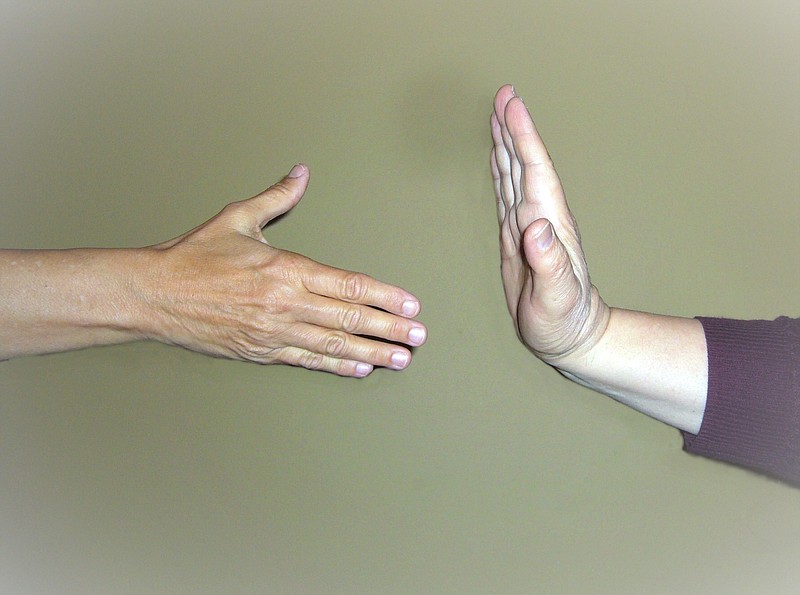I’ve never been especially fond of shaking hands. As a child, I rated it on the same level of personal disdain as being kissed by smothering, elderly aunts with the facial hair of a porcupine.
I lay the blame squarely in the palm of an uncle, the worst hand shaker imaginable – at least to a 10-year-old child. So violent were his greetings, they could be measured on the Richter scale.
Today, I may be older and more tolerant, but definitely more germophobic. So the thought of millions of bacteria and viruses hitching a ride on our skin during this traditional human greeting ritual only makes it more hideous – more so this year with concerns of the spreading coronavirus.
When you really think about it, handshaking may seem a rather odd custom. Its origin possibly dates from Roman times when men carried daggers and similar weaponry for protection as they traveled the long, lonely roads.
Upon meeting a stranger, it’s plausible that travelers may have reached for their daggers and brandished them as a warning to potential assailants. Not a particularly friendly gesture, perhaps, and even today not an entirely unknown practice in some urban areas.
However, once it was established that the new acquaintance posed no threat, blades could be re-sheathed and open hands extended to demonstrate a benign intent. Gripping hands confirmed your new, best-buddy status.
In recent weeks, many have suspended the handshaking greeting or replaced it with the even more absurd fist or elbow bumping ritual because it seems humans are incapable of evolving beyond the need for physical touch when they meet.
But perhaps this should come as no surprise since there is clearly a biological component associated with greeting rituals – they are not restricted to humans. Other primates, such as chimpanzees, greet each other by touching hands, too, although they rarely reach for weapons or antiseptic hand wipes.
Handshaking is a somewhat simplistic form of greeting compared to the more elaborate behavior displayed by other animals. In fact, methods of expressing greetings in other species are as varied as the species themselves.
For instance, wild dolphins greet their pals using individual whistle signatures. Each has a unique whistle which they use to recognize one another. In the case of large cats, such as lions, they generally greet by rubbing their heads and bodies against each other – unwise for humans to mimic during an initial meeting, since this gesture could be misinterpreted.
Personally, I prefer to remain a little more aloof like domestic cats. They are far less demonstrative than their larger cousins, and merely put their tails straight up in the air when a fellow feline approaches.
Elephants say “hi” by entwining their trunks; giraffes press their necks together; and horses rub noses. Wolves wave their tails and lick each other's face, while penguins tap their bills together.
Rats also acknowledge their pals. They will face each other, standing high on hind legs, and emit a series of squeaks and squeals – a ritual they probably learned from watching humans who behave in much the same fashion when they themselves unexpectedly come upon a rodent lurking in the pantry.
As uncomfortable as handshaking is for some of us humans, it’s certainly preferable to other greetings in the animal kingdom – canine tailgating obviously comes to mind. In fact, quite a few animal species are clearly in need of etiquette lessons when it comes to salutations.
For instance, lobsters greet by squirting urine on each other. It appears that when two boisterous males meet, their urine carries a record of who’s the boss and this helps to avoid fights – although conflict would promptly escalate should humans adopt this crustacean welcoming gesture.
Even mammals can demonstrate less than hygienic greetings. Hippos display aggressive and territorial characteristics by hurling excrement on rivals when they meet in the herd. If this practice sounds somewhat familiar, it should. You may have observed it in human society, particularly during a ritual known as “political campaigning.”
While it may be tempting to rebuff the unrelenting handshaking fist-bumping elbow-thumping greeter with Charlton Heston’s famous Planet of the Apes “Get your stinkin’ paws off me” line, perhaps we can just respect each other’s space and stick to a simple “Hello!” From a distance, of course.
Nick Thomas teaches at Auburn University at Montgomery, Ala., and has written features, columns, and interviews for over 800 magazines and newspapers. See www.getnick.org.
